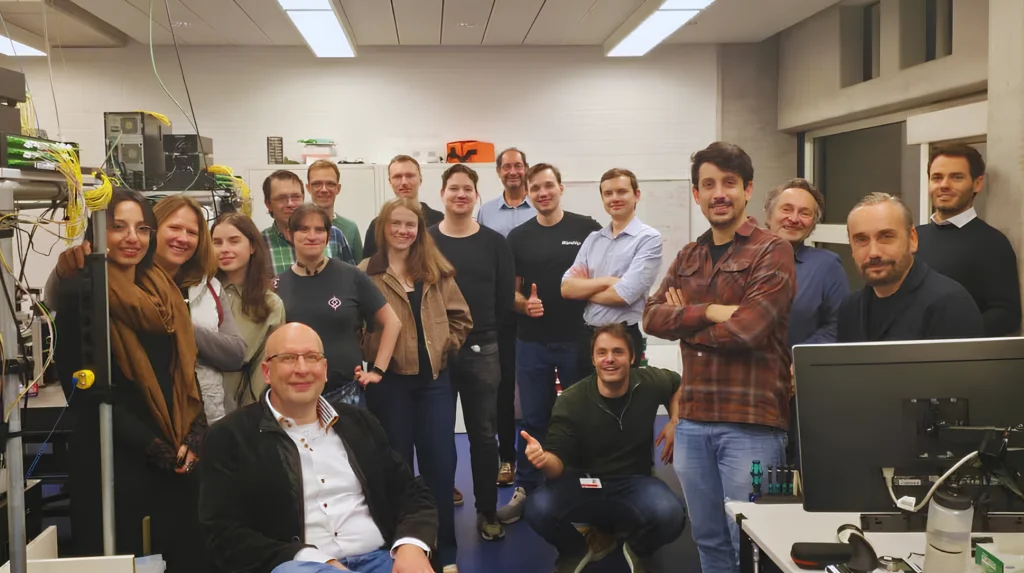Insider Brief
- The U.S. must strengthen quantum technology collaborations with industry and allies to maintain its lead, as identified challenges include securing long-term investment, building a specialized supply chain, and bridging a critical talent gap, according to a CSIS research article.
- Industry experts emphasize that quantum’s commercial applications remain unproven, deterring investors; communicating specific use cases to potential customers could increase funding and move the industry forward.
- Export controls are seen as a barrier to effective collaboration, but new U.S. policies like the interim final rule (IFR) could streamline partnerships with allies who adopt similar technology protections.
The development of quantum technologies is poised to reshape computing, encryption, and strategic sensing, potentially creating either a critical advantage or a dangerous gap for global players in the technology race, according to researchers from the Center for Strategic and International Studies (CSIS).
However, the researchers added that while the United States currently leads in quantum technology, that lead may be narrowing. To remain competitive, the United States must collaborate closely with both industry and international allies, including the Five Eyes (FVEY) nations, namely the United States, United Kingdom, Canada, Australia and New Zealand
According to the article on quantum collaborations, written by Julia Dickson, a research associate at CSIS’s International Security Program and Emily Harding, director of the Intelligence, National Security, and Technology Program at CSIS, experts from governments, industry and think tanks at a recent CSIS roundtable hosted by CSIS identified four key challenges in the collaboration process: securing adequate funding, building a resilient supply chain, addressing a talent shortage and navigating export controls to strengthen partnerships. The experts also suggested ways to surmount these hurdles to fully unleash quantum technology for science and societal good.

Challenge 1: Securing Adequate Capital
The emerging quantum computing industry faces a unique challenge in attracting sufficient capital, largely because the technology is in its infancy and returns are uncertain. According to the researchers, while quantum computing could ultimately solve high-stakes problems across sectors like aerospace, pharmaceuticals and finance, the specific applications are unproven. As a result, investors are cautious. Industry leaders face the challenge of explaining that quantum computing has vast potential without yet having many clearly defined use cases.
Compounding this issue, investment in quantum technology dropped significantly as private investors redirected funds toward generative artificial intelligence, a field with more immediate returns. According to the CSIS study, quantum startups raised about a billion dollars less in venture capital in 2023than they did the previous year, in part due to the AI boom. Participants agreed that for quantum technology to attract the investment it needs, the industry must focus on clear, concrete applications relevant to national security and economic goals, the researchers report.
Participants also recommended that researchers publish peer-reviewed articles that detail quantum applications, which would allow stakeholders to better evaluate the technology’s potential. DARPA’s Quantum Benchmarking Initiative, for instance, is cited as a model for providing validated progress updates in quantum development.
As one expert noted, focusing on specific outcomes rather than complex hardware may make quantum technology more accessible to potential investors.
The expert told the panel: “We’ve all been on the other side of the table working in government where a commercial entity comes in and says, look at this tech, it’s great. And you think, okay, but how does this solve my problem?”
Challenge 2: Building a Quantum Supply Chain
The quantum technology industry currently lacks the infrastructure to produce the highly specialized components it requires, creating a bottleneck in scaling up production. According to the article, because there is limited demand for quantum parts at this stage, suppliers have little financial incentive to produce components at scale. This cycle of low demand and limited supply is holding back quantum research and development. One participant remarked on the dilemma, asking, “Sell to whom exactly?”
The U.S. Office of Strategic Capital (OSC) has stepped in to address this supply chain gap by providing loan guarantees to attract private investment in critical technologies with national security applications, including quantum. The researchers noted that Undersecretary of Defense for Research and Engineering Heidi Shyu emphasized that OSC-backed financing could help strengthen supply chains by supporting companies that manufacture critical quantum components.
Participants said that similar initiatives among U.S. allies, such as subsidies or additional loan guarantees, could further bolster the global quantum supply chain.
Challenge 3: Addressing the Quantum Talent Shortage
Like many high-tech sectors, the quantum industry faces a severe talent shortage.
Demand for quantum specialists in the United States vastly outpaces supply, with estimates suggesting that only one out of every three quantum job openings will be filled by 2025. Furthermore, even among STEM graduates, knowledge about quantum technology remains limited, and academic programs often fail to provide the specific skills that employers seek.
To address this shortage, the U.S. should consider integrating quantum studies into high school STEM programs, supporting quantum training at universities, and developing professional training for graduates. Participants said that initiatives such as the Next Generation Quantum Leaders Pilot Program, created by the CHIPS and Science Act of 2022, may help by embedding quantum concepts in education and preparing a new generation of specialists.
The researchers write: “the Chips and Science Act of 2022 calls on the National Science Foundation to ‘increase the integration of quantum information and science and engineering into the STEM curriculum at all education levels’ and create a pilot program called the ‘Next Generation Quantum Leaders Pilot Program to educate “the next generation of students and teachers in the fundamental principles of quantum mechanics.’”
According to the researchers, the private sector also has a role to play by offering internships and hands-on training for students. Participants noted that summer internships are rare in quantum, leaving students without practical experience upon graduation.
One U.S. government expert observed that this gap in training has made it harder for students to transition smoothly into quantum careers. International cooperation, particularly with allies that have more developed quantum talent pools, could help address the shortage, ensuring that the industry has a stable pipeline of skilled workers.
Challenge 4: Navigating Export Controls and Strengthening Partnerships
Navigating export controls presents a major obstacle for U.S. quantum collaboration — even with allies, especially as Washington becomes more protective of sensitive technology. The U.S. Department of Commerce recently issued an interim final rule (IFR) that introduces license exemptions, allowing exports and reexports to nations with equivalent export controls. According to the researchers, if allies implement similar regulations, the IFR could facilitate smoother collaboration.
Nonetheless, some experts remain cautious, pointing out that as U.S. policies prioritize safeguarding sensitive technologies, there may be an inclination to limit information sharing even with close allies. One participant expressed concerns that an increasingly security-focused political climate in the U.S. could slow down cooperative research. Others, however, saw these concerns as overblown, noting that the IFR aims to enable partnerships with like-minded countries.
To facilitate these partnerships, participants suggested that the U.S. government establish a streamlined communication system within the Department of State and Department of Commerce, appointing designated contacts to navigate export controls and advocate for long-term solutions.
Additional Challenges
The experts also addressed several related topics, including the divide between government and commercial quantum applications. For instance, quantum computing’s role in encryption and decryption for national security can differ vastly from its applications in pharmaceuticals or other commercial sectors. Participants pointed out that quantum development has the “luxury of time,” meaning that governments have the opportunity to thoroughly test and evaluate new technologies before widespread adoption.
According to the researchers, while it is crucial to act with urgency, taking the time to validate quantum applications carefully may ultimately lead to a more successful and sustainable integration of the technology.
The Center for Strategic and International Studies is a Washington, D.C.-based think tank focused on global public policy, providing nonpartisan research on issues ranging from defense and security to technology and economic development.














